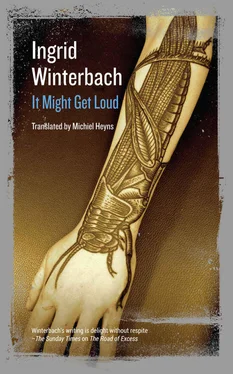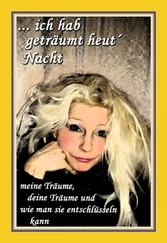She admires Jakobus for finding a place to rest his head here, she couldn’t have done it in this place.
In this second chamber, more or less in its furthest quarter, behind a partition, painted to resemble a brick wall (Josias is an experienced maker of theatre props), lives Lizeka. The one Jakobus refers to as his neighbour, the one he encounters on a corner in Kloof Street, dressed in her black track suit with white stripes up the legs, cell phone pressed to the ear. The one whose son in Bloemfontein has a heart that aches when the weather is thundery. Lizeka’s bed is on a high perch, one of the supports formed by a tree trunk with branches, accessible by means of a little ladder. This partitioned-off area is not large. This space, too, differs radically from what would normally pass for a bedroom. The branches of the trunk are utilised for hanging clothes. Maria looks around her, but there’s not much to be gleaned from the room about the girl who lives here.
They proceed to the third chamber. The wall to the left of the door is covered with crosses of all shapes and dimensions. To the right of the door there are bookshelves against the wall, filled with fire-blackened books. A burnt-out library. Close to the far end of the room, propped up on a pile of planks, is a pig’s head with a ruff around its neck.
‘The pope,’ says Jakobus. ‘Josias calls it the pope.’
Maria inspects it more closely. But one glance into the dead eye, half-concealed behind rigid, white eyelashes, and she turns decisively on her heel. Seen enough. Thank you, she says to Jakobus, that’s about as much as I can take in in one day.
In one of the front rooms lives Dustin, father of the child of Josias B’s eldest daughter, Celia.
‘And where does Josias himself live?’ asks Maria.
‘He has a studio right at the top, on the highest level,’ says Jakobus.
To the right of them, a little distance away, there is another structure, not very big. Maria wants to know if there’s somebody living there as well.
‘A man lived there till a few days ago,’ says Jakobus, ‘But Josias had him taken away. He left cursing Josias all the way.’
‘Who came to take him away?’ asks Maria.
‘The police,’ says Jakobus.
‘Why?’
‘You know, I couldn’t say exactly. He and Josias no longer saw eye-to-eye. To put it mildly. I don’t know what went awry between them. He had started acting strangely. Wore women’s clothing and threatened Josias with a stick.’ Jakobus laughs. ‘I shouldn’t laugh,’ he says, ‘but it was funny, seeing Josias being threatened with a stick on his own turf. The man was actually quite out of control. He wasn’t playing games. From the top of his roof he called down profanities and dark visions upon Josias.’
‘The poor man,’ says Maria, ‘to be taken away like that against his will.’
‘Josias is a formidable opponent,’ says Jakobus, ‘and in his own backyard he’s the commander, the sirdar. He doesn’t put up with being cursed by anybody. And besides, he fancies himself in the role of prophet. He’s not the calibre of man who’s going to say politely, with respect, it’s a pity if that’s how you see things; now do come down from the roof, we’ll try to settle the matter amicably. When challenged, he girds himself for retribution — for war, if need be.’
‘Where did the police take the man?’ Maria asks.
‘I couldn’t say. He was still shouting abuse at Josias from the back of the police van.’
‘What did he shout?’
‘He called down fire and damnation upon Josias.’
‘What did Josias do?’
‘He turned round, washed his hands of the matter, and carried on doing what he’d been doing.’
After this guided tour they have tea in Jakobus’s living quarters. They eat the biscuits Maria brought. She looks at Jakobus’s sculptures. He also makes masks, some of them painted white, like Japanese Noh masks. He makes guns of bent wire, which he then paints in neon colours. The masks and the weapons are all displayed on a table; the bigger sculptures against the wall. Appealing, Maria finds his work, and impressive, and unusual. It’s cold inside the chamber.
‘Lucinda Hlobo made a beeline for you as if she’d been waiting for you all her life. As if you were her long-lost sister,’ says Jakobus.
Maria is surprised to hear it. Surprised that Jakobus should see it like that, but also surprised if that really were the case.
Jakobus tells her about Japanese Noh masks and Butoh. He tells Maria about a black artist who turned up here one day, she’d once done an installation with Josias and a sidekick. Rocked up here in a black Jeep with a six-pack of beer and a six-foot-three tall Greek-Cypriot companion. Josias built a gigantic fire. The woman was a sculptor, just back from a tour de force in Germany. Everyone standing around, beer in hand. Jakobus found the woman interesting, kept an eye on her: Semitic aquiline nose, princess of Swaziland and Sheba. She worked in bull’s hide and bronze. Her self-assurance reminded him of his grandfather on his father’s side: insouciant, uninhibited, outgoing. The embodiment of success. And beautifully subversive. She bubbled and sparkled. She wanted her own helicopter. She wanted to marry a Stuttafords millionaire. Under the old dispensation she would probably have been the head servant on the estate. Thus the tables are turned. She told him that the sculpture he was working on reminded her of a sculpture by Louise Bourgeois. He was charmed, flattered. He wondered where she found a resemblance: in a similarly grotesque passion? She had influential connections. She brought so much hope and joy that evening. He would so have liked to take a trip with her in the black Jeep. With this woman at your side nothing could go wrong. Royalty! The deportment of a queen! The sense of entitlement! The regal nose! The clean lines of her head, the well-shaped body, the supple, shiny, warm-brown skin — warm in the light of the flames.
In the meantime, Jakobus says, Lucinda had come home earlier that evening, but had cleared out quickly and kept her distance all evening. Slunk back to her lair. She must have read the signs at a distance: the black Jeep, the imposing companion, the melodious voice, the self-assurance. Lucinda must have sensed the blinding glamour of success. His heart bled for her. There but for fortune — that could have been her . She’s not the kind of woman who should beat a retreat, tail between the legs. She reminds him of his mother: streetwise, but too proud to admit defeat.
Maria tells him about Benjy, about the situation in which he finds himself, about the death threat. They talk about Sofie for a while. ‘She wasn’t your common poet,’ says Jakobus, ‘she had something you can only compare with Duende — a kind of spirit in her poems that no longer takes account of things like your normal, predictable aesthetic.’
Maria says nothing, a lump in her throat.
‘A catastrophe,’ says Jakobus, ‘a powerful voice that has been silenced.’
Outside, when they go out, the sun is bright, she blinks her eyes, unhabituated to the light after the gloom inside. Here they encounter Lizeka, just back from church. A shy young woman, profoundly embarrassed when she’s introduced to Maria. She averts her face and giggles uncontrollably behind her hand.
Maria remembers that in the first days after Sofie’s death she used to think, in the street, in shops — everywhere: All these people are alive, every one of them doing the daily grind and leading his or her unremarkable life, and she is dead. She saw beggars and drunkards in the street and thought: Even the unworthy are alive, and she is dead.
Just as they turn back, they encounter Josias Brandt at last. So this is the man. The fabulous director of operations, as Jakobus has on occasion referred to him. The operations being the gardens, the animals, the sheltering and caring for foster children, the appointing of the chambers. The man at the helm here, with whom everything started. Josias is bulky, strongly built, extremely vital and youthful of appearance, in spite of his white patriarchal beard (and probably not yet sixty either), with the bluest of blue eyes. He’s wearing a straw hat and sandals. A direct gaze, a no-nonsense man, thinks Maria. Not a man to pick a quarrel with. Brusque, but not unfriendly. Vigorous, that’s clear, and energetic. He’s on his way to fix the rabbit hutches.
Читать дальше












